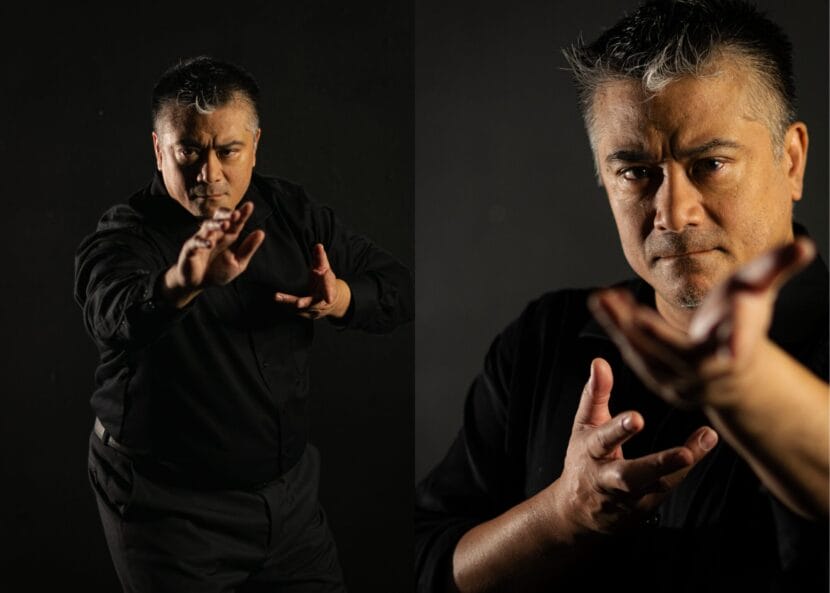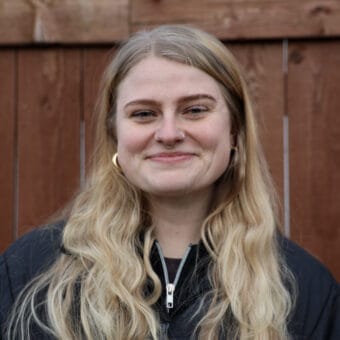
This is Tongass Voices, a series from KTOO sharing weekly perspectives from the homelands of the Áak’w Kwáan and beyond.
Ariel Estrada wrote a one-man play that’s coming to Juneau this week. In fact, it’s the world premiere of Full Contact, a play that stretches from his father’s immigration to Southeast Alaska, to teaching LGBTQ+ self-defense at a martial arts dojo in New York City.
The show’s run in Juneau kicks off Wednesday with a pay-as–you-can preview.
Audio PlayerThis transcript has been lightly edited for clarity.
Ariel Estrada: Performing this play in Southeast Alaska — it’s so wonderful to be coming back here back to my roots, basically.
Hi, I’m Ariel Estrada, and I am the writer and performer of the play Full Contact, which is performing at Perseverance Theater, December 6 through 22nd directed by Leslie Ishii.
I lived in Alaska since nine years old. My dad was in the Coast Guard, and we transferred to Sitka, and he fell in love with Sitka, and he had to stay. And in many ways, I’m so glad that I have come back here, because there’s parts of my time in Sitka that are actually reflected in the play. And the history of Filipinos in Alaska is also reflected in the play.
The short version of it is that Filipinos came up here for the salmon fisheries because there was — we called the Manongs, which in Tagalog means the brothers — who would travel up and down the West Coast.Oranges, apples, fish every year, because they were itinerant workers.
The times when they came here in the late 19th century, there wasn’t the ability to really stay in many communities. Because they were segregated, they were kept out of being able to actually maintain a place to stay. This thankfully started easing up over time, and they were able to start settling in the places that they were being migrant workers at, including Alaska, Southeast Alaska in particular. And because of that, there’s a pretty significant Filipino population here in Alaska.
So Full Contact is my story of being in a martial arts group training heavy duty, full contact martial arts for about 20 years of my life, and they were pretty incredible, 20 years, because that was also my coming of age in New York. I had just been doing martial arts since college, and then I got really into it when I moved to New York and ended up opening up a martial arts school with some friends of mine.
At the same time, I was also sort of coming of age as a Filipino person, right, learning more about my identity as a Filipino person, also as an LGBTQIA+ person in New York. The AIDS crisis was starting to become a manageable disease for certain communities, right? And what did that mean as part of that coming of age, right?
And also in that background, having this martial arts organization sort of overarching the entire experience.
It’s been a really amazing process being both the playwright and the performer, because I have to literally take off one hat in one moment and another hat in another. So the playwright in me will write something, and then the actor will come up onto the stage, start rehearsing it, and go, “Who wrote this? This is not working.” And then I had to take off that actor hat, put on the playwright hat, and working with my director, “Go, why isn’t this working? Let’s rewrite it.”
And it’s literally happening within a 10-minute span. We’ll write an entirely new scene and figure out that what we were working on before wasn’t working, and then make it work within that 10 minutes. So it’s a fast and furious process and so much fun. Kind of reminds me of martial arts, actually.
And there’s so much of a collaborative process of being able to create this beautiful, finite experience that people will experience live for the first time. And I strongly believe in my heart that theater can do something that film and TV can’t, right? There’s that immediate communal experience that only happens in a room with people in that second and in that time, and it will go away forever after that, but will live on in their hearts, hopefully as they go out into the world and bring those lessons, or that emotional journey with them as they go out into the world and hopefully make the world a better place.
